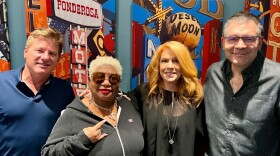Documentary films allow filmmakers a chance to shed new light on a news story.
In early 2016, filmmaker David Byars spent about a month with the men and women who occupied the headquarters of Oregon’s Malheur National Wildlife Refuge. Ammon Bundy, son of Nevada rancher Cliven Bundy, was among them.
The result is a behind-the-scenes look at the occupiers of the refuge headquarters.
Byars’ film, "No Man’s Land", is being shown in St. George, Utah at the Docutah International Documentary Film Festival.
There were other members of the media at the occupation, but Byars was able to get unprecedented access behind the scenes.
“I think the thing that kind of set me a part and allowed me to get access that some of the other media weren't able to get is that I didn't start off filming a ton and shoving a camera in their face and trying to get them to say the craziest thing possible," he said.
Instead, Byars said he mostly listened to the occupiers and talked with them when they were most relaxed.
“The fact that I was out there late at night and these guys were kind of letting their guard down a little bit it was also the time that I got to know the personalities behind this occupation a little bit better rather than seeing their public face, which is very buttoned up, very sticking to certain talking points and very serious,” he said.
While the rest of the country might have seen the more serious side of the occupiers, Byars said the inside of the compound was much different.
“I think the perception from within the occupation and from without was very different. If you’re on the outside looking in you’re seeing a bunch of guys with guns saying they’re not going to leave and they’ll defend themselves when someone tries to make them leave. Inside, it’s a little bit different. There are some tense moments, but a lot of times it is very relaxed with people just kind of hanging out and smoking cigarettes around a campfire or pitching in in the kitchen. It didn’t seem like a war zone from the inside. I guess the larger question is how much of the First Amendment and the Second Amendment do we want to combine in terms of protest. We’ve seen manifestations of that in Charlottesville and elsewhere recently.”
Byars said the country is asking bigger questions about when constitutional rights conflict and support each other and at what point are "you allowed to disagree with someone to the point where you point a gun at them, saying 'this is me protecting my First Amendment right.'"
After weeks of a mostly peaceful standoff with federal agents, the occupation turned deadly. Robert "LaVoy" Finicum from Arizona was killed when FBI agents and Oregon state police attempted to arrest some of the men and women occupying the refuge.
There were conflicting reports about exactly what happened, but authorities found the Oregon State Police shooting "justified;" however, an FBI agent was indicted on charges of lying about the shooting because he didn't report to the agency that he had also fired a shot. The agent did not hit Finicum but the case did not help the animosity that already existed between the occupiers and their supporters and federal law enforcement.
Byars knew Finicum and talked to him during the occupation.
“I was sad. Anytime that a human being dies by the hands of the state we require some soul-searching and a bit of reflection about what went wrong. I was sad because I knew him a little bit and I sat with him and I had spoken with him at length. He seemed to be very nice person.”
Byars said working on the film has changed him, but the idea he went into the project with was re-enforced.
"I came into this kind of thinking: you know we need to listen to these people. I might disagree with these people but we need to figure out where they’re coming from and what they say their problems were. Maybe set aside any talk about what should be done until we really understand their problems. I think throughout the course of that film… filming and particularly in post-production I think that was just re-enforced that we need to be listening to people. We don’t have to agree with them but we need to listen to them.”
David Byars, filmmaker, "No Man's Land"










